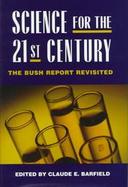Since the publication of the Vannevar Bush Report in 1945, it has been the touchstone for all discussions about science policy. That report, formulated out of the experience of World War II, set forth a case for an enduring partnership between scientific research institutions and the federal government both as a means for generating new technology and as the foundation for achieving technological superiority over America's potential foes.
In this timely reexamination of such issues, a group of the most distinguished economists who have written on science policy over the past decade evaluate the continuing relevance of Bush's arguments and conclusions. Among other issues, the contributors consider the implications of the breakdown of the old model for R&D; whether there is still a rationale for defense-based R&D support; the challenges of universities' increasing dependence on corporate support of research; and what criteria should be established for multinational research.


